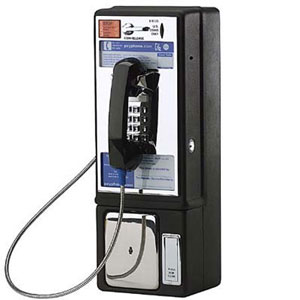 As AT&T joins Verizon selling off its Yellow Pages publishing unit and payphones keep disappearing from street corners, the media is writing the landline obituary once again.
As AT&T joins Verizon selling off its Yellow Pages publishing unit and payphones keep disappearing from street corners, the media is writing the landline obituary once again.
CNN Money asks today whether we’re witnessing the death of the landline.
In as little as 20 years, the concept of a wired phone line may become the novelty a rotary-dial phone represents today. Yes, traditional phone lines will still be found in businesses and in the homes of those uncomfortable dealing with a mobile phone, but America’s largest phone companies are well aware the traditional telephone line is in decline.
[flv width=”412″ height=”330″]http://www.phillipdampier.com/video/ATT Archives What is the Bell System.flv[/flv]
The Bell System, as it was known until the 1980s, used to comprise AT&T, Bell Labs, Western Electric, Long Lines, and two dozen local “operating companies” like New York Telephone, Mountain Bell, etc. This AT&T documentary, from 1976, explores how “the phone company” used to function. New innovations like “lightwave” are showcased, promising to deliver voice phone calls over glass fibers one day.
Much of the technology seen in the documentary may be unfamiliar if you are under 30 (and check out how customer records were maintained back then), but those who remember renting telephones in garish colors from your local phone company will recognize the phones that occupied space in your home not that long ago. The only part of the landline network that hasn’t changed much in the last 40 years is the wiring infrastructure itself, which has been allowed to deteriorate as customers continue to depart.
Why was the company so darn big back then? Because it had to be, the documentary says, to serve a big America. Hilariously, the company defends its then-status as a “regulated monopoly” telling viewers “[a] regulated monopoly works well in communications because you don’t duplicate facilities and you produce real economies over the long haul.” (14 minutes)

CNN reports nearly one-third of all American homes no longer have landline service, double the rate from 2008, triple that of 2007. Verizon is feeling the heat the most, with revenue down 19% over the last five years. AT&T has seen their revenue drop 16.5% over the same period.
But things are not all bad for phone companies willing to spend money upgrading their networks. Verizon’s top-rated FiOS fiber to the home service is a compelling competitor to Comcast and Time Warner Cable. AT&T’s U-verse has gotten a respectable market share larger midwestern cities and draws customers who like its DVR box and the chance to stick it to the local cable company they’ve hated for years.
But where both companies have decided against investing in upgrades — notably in their rural service areas — the traditional phone line is trapped in time. Only the network it depends on is changing, and not for the better.
[flv]http://www.phillipdampier.com/video/ATT 1993-1994 You Will Ad Campaign Compilation.flv[/flv]
Back in 1993, AT&T produced seven advertisements dubbed the “You Will” series, showcasing future technologies AT&T would “deliver to you.” Eerily, the vast majority of these predictions came true, but mostly from companies other than AT&T. While the phone company predicted what would eventually become E-ZPass, Apple’s iPad, Apple’s Siri, the smartphone, Skype, Amazon’s Kindle, the cable industry’s home security apps, video on demand, and GPS navigation, most of those innovations were developed and sold by others.
AT&T spun away Bell Labs and became preoccupied selling Internet access, cell phones and reassembling itself into its former ‘hugeness’ through mergers and buyouts. With limited investment in innovation, AT&T risks being left as a “dumb pipe” provider, selling the connectivity (among many others) to allow other companies’ devices to communicate. (Alert: Loud Volume at around 2 minutes) (4 minutes)
 Verizon decided to ditch its rural service areas to FairPoint Communications in northern New England and Frontier Communications in 14 other states. The results have not been good for the buyers (and often customers). FairPoint went bankrupt in 2009, overwhelmed by the debt it incurred buying phone lines in Vermont, New Hampshire, and Maine. Frontier has watched its sales fall ever since its own landline acquisition, and the company has gotten scores of complaints from ex-Verizon customers about broken promises for improved broadband, billing errors, and poor service.
Verizon decided to ditch its rural service areas to FairPoint Communications in northern New England and Frontier Communications in 14 other states. The results have not been good for the buyers (and often customers). FairPoint went bankrupt in 2009, overwhelmed by the debt it incurred buying phone lines in Vermont, New Hampshire, and Maine. Frontier has watched its sales fall ever since its own landline acquisition, and the company has gotten scores of complaints from ex-Verizon customers about broken promises for improved broadband, billing errors, and poor service.
Analysts predict AT&T will start dumping its rural landline customers in the near future as well, letting the company focus on its U-verse service areas. But who will buy these cast-offs? CNN reports nobody knows. CenturyLink and Windstream, two major independent phone companies, don’t appear to be in the mood to acquire neglected landline facilities they will need to spend millions to repair and upgrade.
One thing is certain — both AT&T and Verizon are tailoring business plans to favor Wall Street approval. The companies’ decisions to temporarily boost revenue selling pieces of its operations has helped stock prices, but has also made the companies shadows of their former selves. Nearly 30 years ago, customers still paid the phone company to rent their home telephones, relied extensively on the companies’ lucrative White and Yellow Pages for directory information, and discovered new technology innovations like digital switching thanks to Bell Labs, the research arm of AT&T — today independent and known as Alcatel-Lucent. Today, people in some cities cannot even find a telephone company-owned payphone.
[flv width=”360″ height=”290″]http://www.phillipdampier.com/video/WJBK Detroit Quest to Find a Working Pay Phone 4-10-12.mp4[/flv]
WJBK in Detroit this week ventured out across Detroit to see if they could find a pay phone that actually works. That old phone booth on the corner is long gone, and some admit they haven’t touched a pay phone in 20 years. (2 minutes)
 Subscribe
Subscribe









